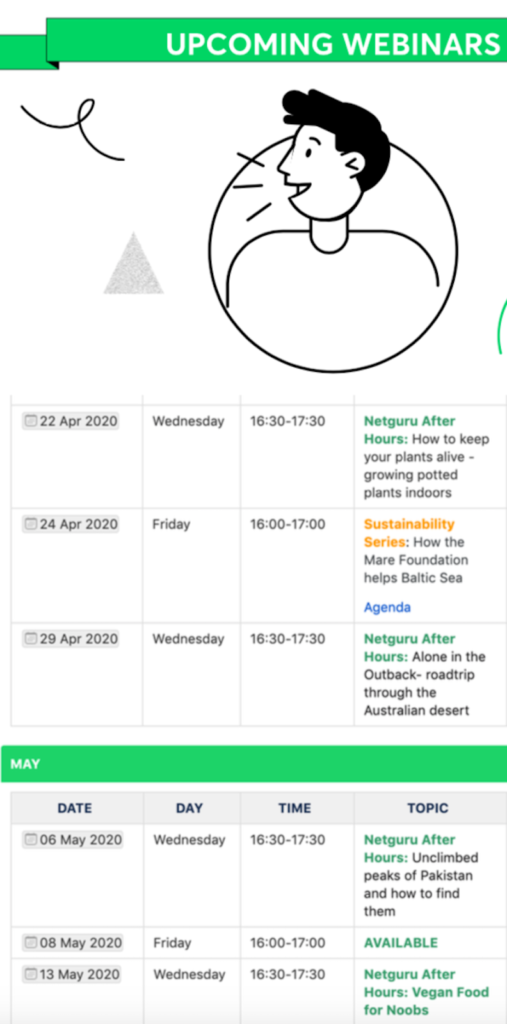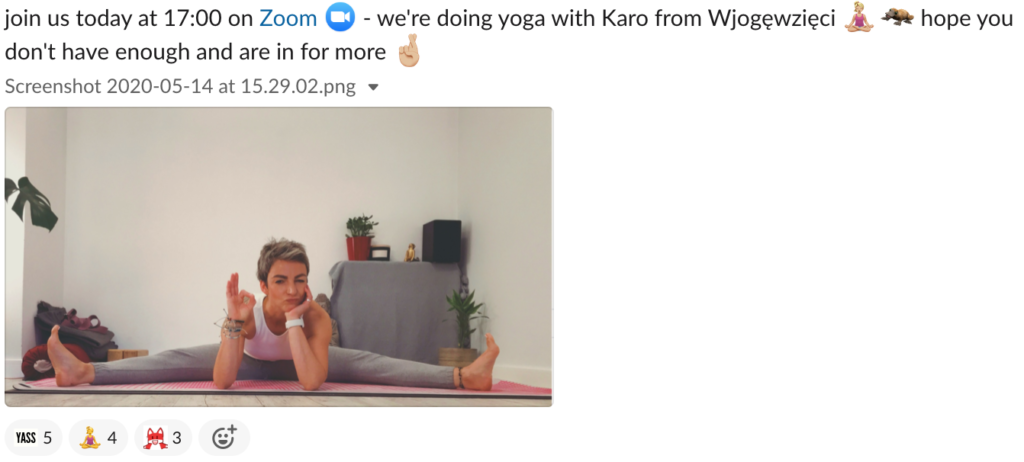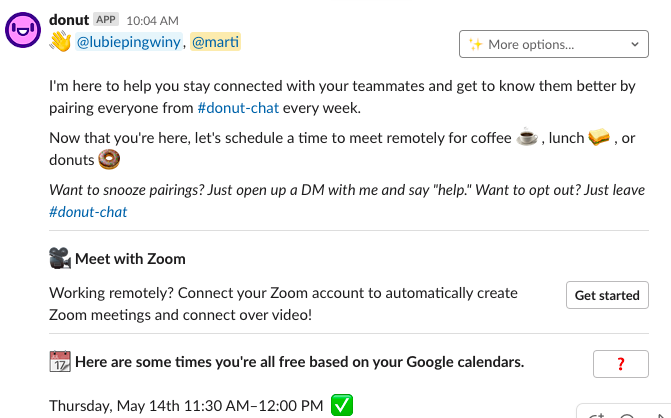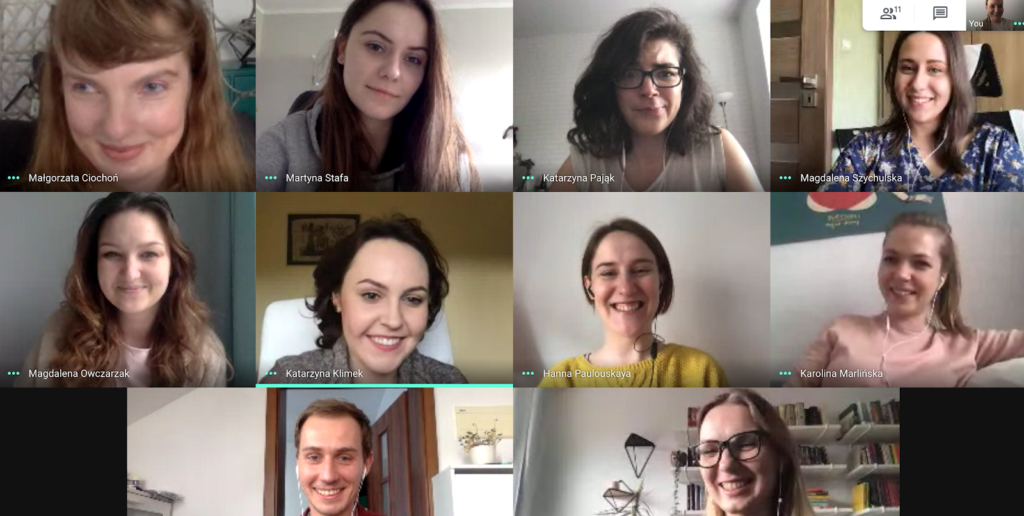Netguru vs Lockdown - What Has It Changed in Our Culture & Recruitment

Although many industries are affected, some of them have suffered less than others. The IT industry is definitely one of them. This isn’t to say that we’re not facing any challenges - quite the opposite.
Read an interview with Martyna Stafa and Katrzyna Klimek - our Recruitment Specialists.
Part 1: Remote work and organizational culture
Paulina Płoska (HelloHR): Please tell me about your transition to 100% remote work. Many organizations described this process as logistically complicated and challenging in general. What did it look like in your case? Did everything go smoothly?
Martyna Stafa (Recruitment Specialist at Netguru): As far as switching to remote work is concerned, we got word on Monday that on we’re going to have to close 9 offices and go fully remote on Wednesday. Shutting down the offices and transitioning to 100% work-from-home took us less than 24 hours. The whole process went smoothly because remote work is really deeply rooted in Netguru’s organizational culture. Before the pandemic hit, around 40% of our team worked remotely all of the time and the remaining 60% worked from home and the office interchangeably.
Paulina Płoska: So what did you do? Did you take any special steps or introduce new procedures?
Martyna Stafa: The first step was forming a project group headed by the Head of Operations. The group was responsible for implementing new procedures and ensuring constant communication regarding those. We wanted to make sure that those of our employees who normally prefer to come in to the office had as much comfort as possible when working from home. This is why when we closed our offices, we allowed our employees to take home equipment like keyboards, screens and chairs. Now, all new employees receive a 1000 PLN bonus to buy equipment for their home offices.
Katarzyna Klimek (Recruitment Specialist at Netguru): I concur. Everything went smoothly organization-wise. We’re aspiring to become a fully remote-first company, so there wasn’t a lot of logistics involved in adapting to the new reality. I’d just like to add that our company made the decision to go fully remote much quicker than others - we made it ten days earlier. I think it was the right call.
Paulina Płoska: What online recruitment tools do you use on a day-to-day basis? Do you like some of the solutions more than others? Are there tools that you’d like to recommend?
Katarzyna: The main tool we use for candidate interviews and video calls is Google Meet. As for our ATS (application tracking system), we use Workable. Meetings are scheduled using Calendly. Internally, we communicate using Slack, which is integrated with most of the tools and data points we use. We mostly use email for external communication. We also use the entire Google Drive suite.
Paulina: One could say that right now we’re in a state of “forced” remote work. So, to go against the grain, I’d like to ask you about the benefits of that. How does the organization benefit from operating this way?
Katarzyna: Although the situation is difficult, I do in fact see a lot of advantages to it. One of them is that the recruitment team has grown a lot closer, we really support each other. When meetings start, we make sure to talk about non-work stuff, just to catch up. This has shown us that we can really support each other even in difficult situations. We started saying hello and goodbye to each other on Slack every day. Another positive development is our Spotify playlist - the person who starts work first chooses a song for the day. This shows that in difficult situations we really come together, support each other. From my point of view, a paradoxical observation is that the team has become more tightly knit than before.

Another issue is gaining and sharing knowledge - we do much more of that now. During the first days of the pandemic, when people started all conferences and trainings, I was very disappointed. Luckily, may events managed to rethink their agendas and move online. I no longer have to drive from Lublin to Warsaw - I can get to the event with just a click! I think that’s great. We also did a lot more knowledge sharing at Netguru. For instance, we help other companies transition to remote work.

Paulina: How about you, Martyna? You used to come in to the office much more, what does it all look like from your perspective?
Martyna: I completely agree with Kasia. One thing I’d like to highlight is the efficiency of work. This is a divisive subject - many people say that they’re less effective at home because of all the distractions. I approached the subject systematically and started to plan my days in a conscious way. I’m not an expert yet - I can see a lot of room for improvement. Still, I think that, paradoxically, we can do more from home, provided of course that we have friendly conditions to do so.
I think a good idea is to - if you can - make a conscious effort to observe your habits, see whether you’re at your best in the morning or in the afternoon, and build your schedule around that. For example, if you’re a morning person, schedule your most taxing tasks for the morning. Personally, I’m the most effective in the afternoon, so I reserve midday for meetings, email and so on. One thing I’d like to stress is that remote work lets me manage my tasks more freely, which gives me more control over my time. Working from home saves a lot of time that would otherwise be spent commuting or looking for a free conference room at the office.
Paulina: Netguru has a really well-developed organizational culture. In fact, you are an inspiration to many companies. So, tell me - has your culture suffered because of the coronavirus? Or did you manage to add something new to it?
Katarzyna: I have to admit that initially I was scared and disappointed, especially because we were forced to postpone our annual conference, an event that everyone at Netguru attends. We missed a lot of opportunities for additional meetings and I think that’s a major loss, especially for someone who works remotely like me. A lot of online team-building initiatives popped up really quickly and helped us grow closer as a team.

Every morning we have an online stretching session - an idea that a team member came up with. We also have a weekly yoga class led by a professional instructor - another new initiative. We have online meeting where we talk about our interests - another chance to get to know each other better.

Martyna: This period has definitely affected our culture positively. We have a new app, Donut chat, that pairs people and creates a Slack conversation for them, allowing them to schedule a quick meeting. It’s a way to get to know other employees that you might not have met otherwise. It’s also a chance to get a break from everyday work, which is especially important in these trying times.

Part 2: Recruitment
Paulina Płoska: You both work as recruiters, you’re experts at this. How has Netguru’s approach to recruitment changed in recent times?
Katarzyna Klimek: When it comes to the recruitment process itself, there have been no radical changes. We still use the same tools as before. The only change that’s visible in the final part of the process is onboarding - we now onboard people remotely. Although the pandemic hasn’t affected IT as much as it has, for example, tourism, we decided to extend a helping hand to freelancers operating in various industries by offering them recruitment for specific projects through the Talent Marketplace platform.
Martyna Stafa: Transparent communication with candidates has always been a priority for us. As a result, we always kept in constant touch with them. All the changes on the labor market mean that we’re doing that even more. Personally I’ve noticed that I’m talking to candidates on the phone much more. I want them to get all the key information without any misunderstandings. We still give candidates feedback about their applications, which gives them a complete view of the areas where they did and well as well as the ones where there’s still room for improvement.

Paulina: How about candidate prep? Do you have any good practices or additional steps that you take before the online meeting even takes place?
Martyna: At the very beginning we always let the candidate know about the details of the process and its stages. This allows candidates to make informed decisions about applying and taking part in the process.
When we invite a candidate, we inform him or her about all the organizational details, such as duration and participants. We remind candidates to check their mic and camera, making sure to let them know in advance that video will be used during the call. Because we want all candidates to have an equal chance, we always ask them if they need any disability-related accommodations. This is to avoid situations when, for example, a candidate can’t hear a question and so doesn’t say anything despite knowing the answer. All candidates also receive information about the goal and format of the interview so that they can prepare.
Netguru puts out a lot of diverse content, including content aimed at potential candidates. Our goal is to present how Netguru works from the inside: what's our organizational culture, what our daily work looks like. We also write articles with lots of information about preparing for the recruitment process for a specific position. These are based on real stories of our employees - candidates can find them on our blog.
Paulina: What kind of personal traits do you look for in candidates for 100% remote positions? Is recruiting for office-based positions different from recruiting for remote ones?
Martyna: Face to face communication is very different from written communication, which makes up the majority of communication you do during remote work. So, we look very closely at how candidates deal with feedback they receive on a video call. We also pay attention to the way they give feedback. This is very important to us in teams that work together remotely. We also pay attention to how candidates manage their time during remote work. We check these skills during our interviews using practical examples. Prioritization is also a very important skill for us, because we often work on multiple projects at the same time.
Katarzyna: I agree, time management is very important. I’d also like to add that there is no single right solution to the tasks that Martyna mentioned, their point is to show the candidate’s thinking. We ask candidates about situations in their professional lives where they had to deliver multiple important tasks in a short time. We ask them to describe to us how they dealt with them. Sometimes we describe two tasks and ask the candidate to say which one they’d take on first and why/ We also check candidates’ communication skills, with an emphasis on situations that happen in distributed teams. These also don’t have “right” answers - we want to learn the candidates’ preferred ways of communication, the ones that work best for them.
Paulina: Katarzyna, did you introduce any improvements recently? Can you tell us about any changes to your recruitment process that you’ve seen positively affect candidates?
Katarzyna: We started measuring Initial Contact Time, the time it takes from us receiving the application to reach out to the candidate for the first time. We don’t want to leave candidates hanging, so we’ve decided that every candidate must receive a reply within 10 business hours. Right now, we contact every applicant via email. We thank them for their application, give them a specific date on which we’ll give them feedback on their CV, and let them know what the next steps are if we decide to move forward with their candidacy.
Paulina: We’ve already talked about online meeting dos. How about some don’ts? What should you avoid during online recruitment or remote team meetings?
Katarzyna: The first thing to avoid is doing multiple things at the same time. To avoid miscommunications, you should always let the candidate or the team know that you’ll be taking notes. This prevents them from feeling like you’re not paying attention. This is very important during job interviews - you have to take notes to be able to give the candidate detailed feedback after the meeting.
Martyna: We often share our screens during interviews. It’s a good idea to disable Slack and Gmail notifications to prevent the interviewee from seeing your messages.
Paulina: I know that Netguru does something special to take care of employee well-being. What is it? Kasia, you mentioned that your conference was postponed and some meetings were canceled. But you still do team-building events, right?
Katarzyna: We had a team-building event for the entire HR team planned for late March 2020. We had to move it online because of the pandemic. We’ve implemented a lot of new ideas, such as the Netguru After Hours webinars, where employees share their passions - travel, cooking, plant care. We’ve also started using new applications, for example Donut - it pairs new employees for short coffee or lunch calls and lets them get to know each other.
There were also some external events that we had planned for last year, for example Disruption Forum New York. The marketing team, which was responsible for the event, followed the situation on the ground both in Europe and the US. In the end, the event took place online - the first conference of its kind organized by Netguru. We received a lot of positive feedback from both participants and panelists, and the event itself had great attendance. Since then, we’ve organized another three editions of Disruption Forum, and fully launched a weekly series of Disruption Talks livestreams with world’s top innovators from companies like Visa or Sony. We’re already planning more events, which are also going to take place online.
Martyna: During the quarantine we also created many new Slack channels, for example #mental-health, where we talk about staying well during this trying time. Although remote work is deeply rooted in Netguru’s organizational culture, some people still prefer to work from the office. The pandemic deprived them of that possibility, and so the channel had a lot of interesting information, inspiration and tips about working remotely.
The interview was published on HelloHR / Source: RocketJobs


